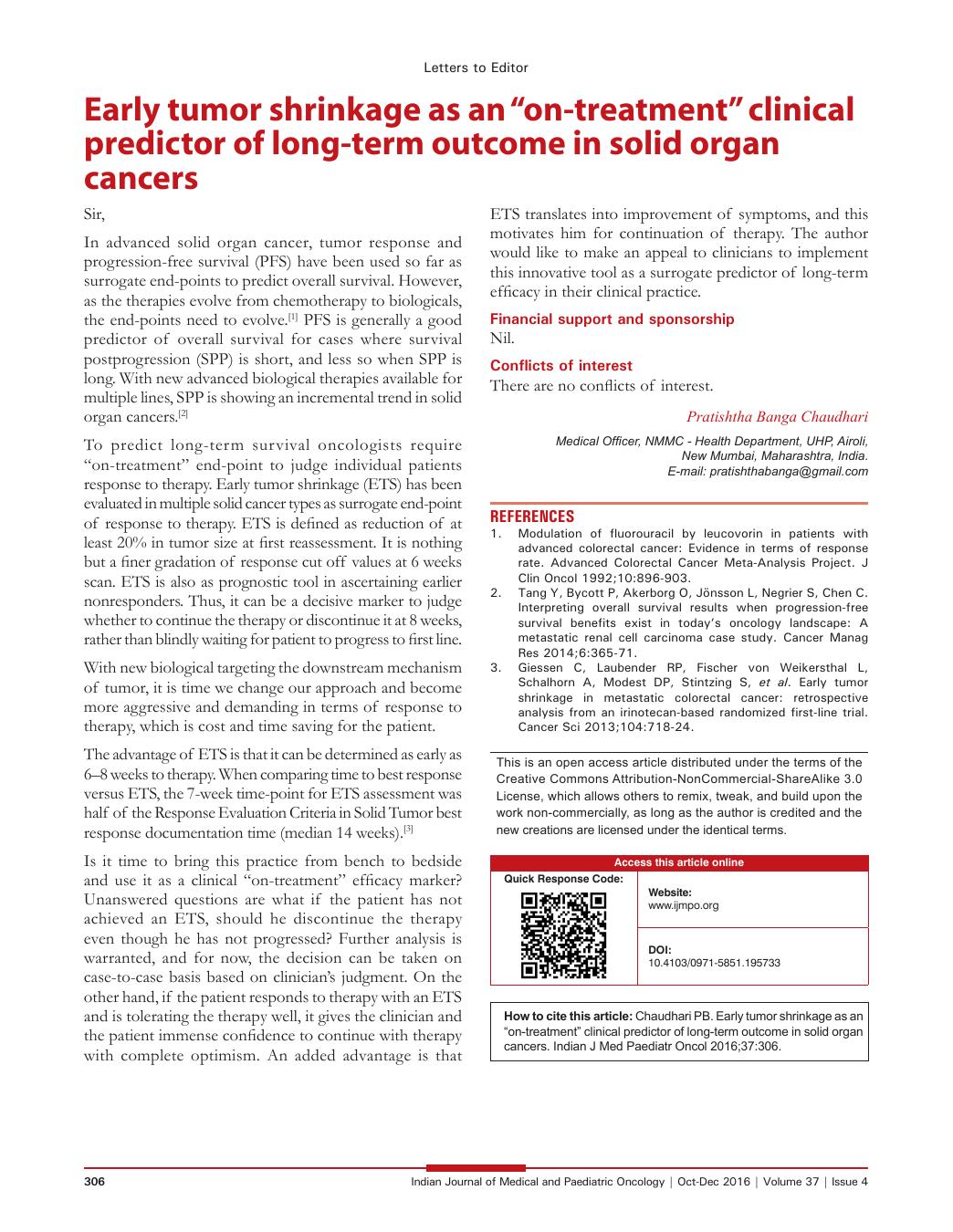Early tumor shrinkage as an “on-treatment” clinical predictor of long-term outcome in solid organ cancers
CC BY-NC-ND 4.0 · Indian J Med Paediatr Oncol 2016; 37(04): 306
DOI: DOI: 10.4103/0971-5851.195733

Publication History
Article published online:
12 July 2021
© 2016. Indian Society of Medical and Paediatric Oncology. This is an open access article published by Thieme under the terms of the Creative Commons Attribution-NonDerivative-NonCommercial-License, permitting copying and reproduction so long as the original work is given appropriate credit. Contents may not be used for commercial purposes, or adapted, remixed, transformed or built upon. (https://creativecommons.org/licenses/by-nc-nd/4.0/.)
Thieme Medical and Scientific Publishers Pvt. Ltd.
A-12, 2nd Floor, Sector 2, Noida-201301 UP, India
Sir,
In advanced solid organ cancer, tumor response and progression-free survival (PFS) have been used so far as surrogate end-points to predict overall survival. However, as the therapies evolve from chemotherapy to biologicals, the end-points need to evolve.[1] PFS is generally a good predictor of overall survival for cases where survival postprogression (SPP) is short, and less so when SPP is long. With new advanced biological therapies available for multiple lines, SPP is showing an incremental trend in solid organ cancers.[2]
To predict long-term survival oncologists require “on-treatment” end-point to judge individual patients response to therapy. Early tumor shrinkage (ETS) has been evaluated in multiple solid cancer types as surrogate end-point of response to therapy. ETS is defined as reduction of at least 20% in tumor size at first reassessment. It is nothing but a finer gradation of response cut off values at 6 weeks scan. ETS is also as prognostic tool in ascertaining earlier nonresponders. Thus, it can be a decisive marker to judge whether to continue the therapy or discontinue it at 8 weeks, rather than blindly waiting for patient to progress to first line.
With new biological targeting the downstream mechanism of tumor, it is time we change our approach and become more aggressive and demanding in terms of response to therapy, which is cost and time saving for the patient.
The advantage of ETS is that it can be determined as early as 6–8 weeks to therapy. When comparing time to best response versus ETS, the 7-week time-point for ETS assessment was half of the Response Evaluation Criteria in Solid Tumor best response documentation time (median 14 weeks).[3]
Is it time to bring this practice from bench to bedside and use it as a clinical “on-treatment” efficacy marker? Unanswered questions are what if the patient has not achieved an ETS, should he discontinue the therapy even though he has not progressed? Further analysis is warranted, and for now, the decision can be taken on case-to-case basis based on clinician's judgment. On the other hand, if the patient responds to therapy with an ETS and is tolerating the therapy well, it gives the clinician and the patient immense confidence to continue with therapy with complete optimism. An added advantage is that ETS translates into improvement of symptoms, and this motivates him for continuation of therapy. The author would like to make an appeal to clinicians to implement this innovative tool as a surrogate predictor of long-term efficacy in their clinical practice.
Financial support and sponsorshipNil.
Conflicts of interest
There are no conflicts of interest.


 PDF
PDF  Views
Views  Share
Share

